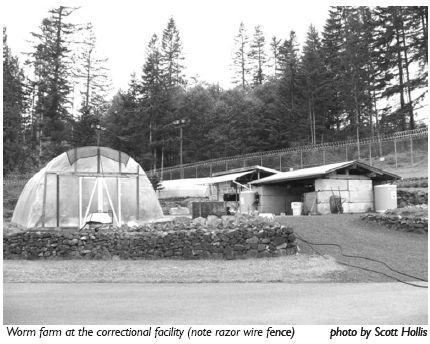Green Reform: Prisons Partner with Higher Ed to Embrace Sustainabilityby Scott Hollis Sustainability is no longer just a buzzword relegated to academia, environmentalists and activists. Government institutions are now realizing that reducing their ecological footprint means saving increasingly scarce funds.
That's the impetus for a new inter-agency agreement between the Washington State Department of Corrections (DOC) and The Evergreen State College (TESC). Together, they are developing, maintaining and evaluating sustainability projects at DOC facilities that will engage prisoners and DOC staff with faculty, students and visiting researchers. The program carries with it a grant for $300,000 from the DOC that will cover the project costs, carry out research, seminars, training and educational opportunities for offenders. "This is a positive program on all levels," said DOC Deputy Director Dan Pacholke. "The most obvious benefit is that our facilities now have less of an impact on the environment. Beyond that, inmates earn job skills that are increasingly in demand as the number of 'green collar' jobs increase. And this benefits higher education because it gives researchers an excellent controlled environment to study sustainability." The terms of the agreement state the DOC will enhance economic and ecological sustainability of Washington's prisons, and—equally important—will develop opportunities for education after offenders are released. TESC will create opportunities for students in higher education to gain experience in sustainability, social work and community studies. Enforced institutional settings such as penitentiaries offer ideal opportunities to collect baseline data from measurable inputs and outputs of materials and energy, and a stable population by which to monitor the implementation of sustainability measures. Already, sustainability pilot projects at Washington State's Cedar Creek Correction Center (CCCC) have helped the center start an organic garden, a recycling program for solid waste, a worm-composting bin for kitchen waste, a bee-keeping facility, and the establishment of water catchment tanks. As a result, CCCC grew 15,000 pounds of organic food, reducing food costs by over $17,000; composted 2,000 pounds of food per month, saving over $3,000 in landfill costs; recycled solid waste, saving $12,000; and saved nearly $2,000 on water catchment. These cost reductions equal $85 per inmate per year, which, extrapolated to the total inmate population in Washington State (17,000), would save tax payers nearly $1.5 million per year. This figure will likely increase as learning curve impact and economies of scale increase efficiency. Participants in CCCC's pilot program viewed the projects positively, inspiring a number of them to pursue professional and educational goals after release. Accordingly, the new agreement will provide staff to develop sustainability projects appropriate to the prison setting that involve hands-on teaching and learning. Staff also will engage a set of researchers whose projects are appropriate to engage offenders and collect data within the prison. A monthly seminar series for staff and offenders will be presented by researchers and sustainability practitioners. Staff also will disseminate information on higher education at the time of inmate release for related fields of study. "We are developing lectures in basic science as well as training in fields such as urban horticulture, for which at least part of the preparation can be done inside the walls, to improve the prison intellectually as well as physically," said TESC Professor Nalini Nadkarni. "I'm excited both about learning opportunities for the scientists who provide the information, as well as the offenders who receive it. Based on our previous experiences, information will be exchanged in both directions." This pairing of institutions is a unique opportunity for TESC, because it will help fulfill its mission to promote learning through interdisciplinary study, learning across significant differences, and linking theory with practical application. The program will help TESC faculty and staff connect student learning to operational practices that reflect their commitment to a sustainable future. In 2005, TESC developed a model curriculum in sustainability that uses at its core both whole-systems theory and the liberal arts. In winter 2009, the Master of Environmental Studies program will offer the course "Assessment of Sustainability and Energy Efficiency," which will serve as an excellent case study using data collected in the sustainable prisons program. The Sustainable Prisons project will provide an easier framework for other institutions to replicate or develop similar approaches, and ultimately to transform society. For more information, contact Nalini Nadkarni at (360) 867-6621; nadkarnn@evergreen.edu; or Dan Pacholke, Dept. of Corrections, djpacholke@doc1.wa.gov. Scott Hollis is a communications consultant for the Green Prisons Program and office manager at the International Canopy Network (ICAN) at The Evergreen State College.
Back to Home page. |

